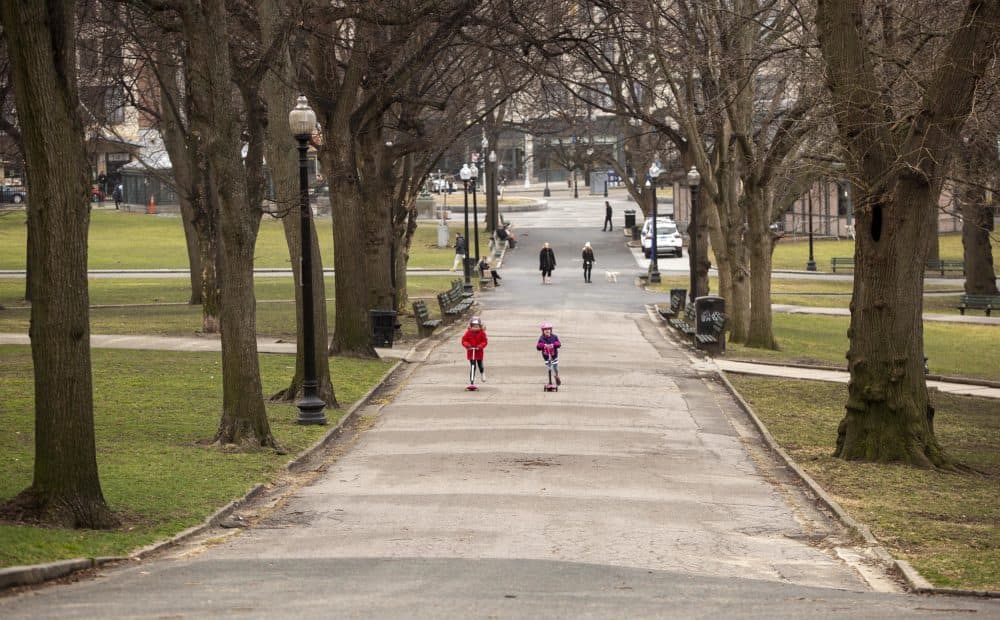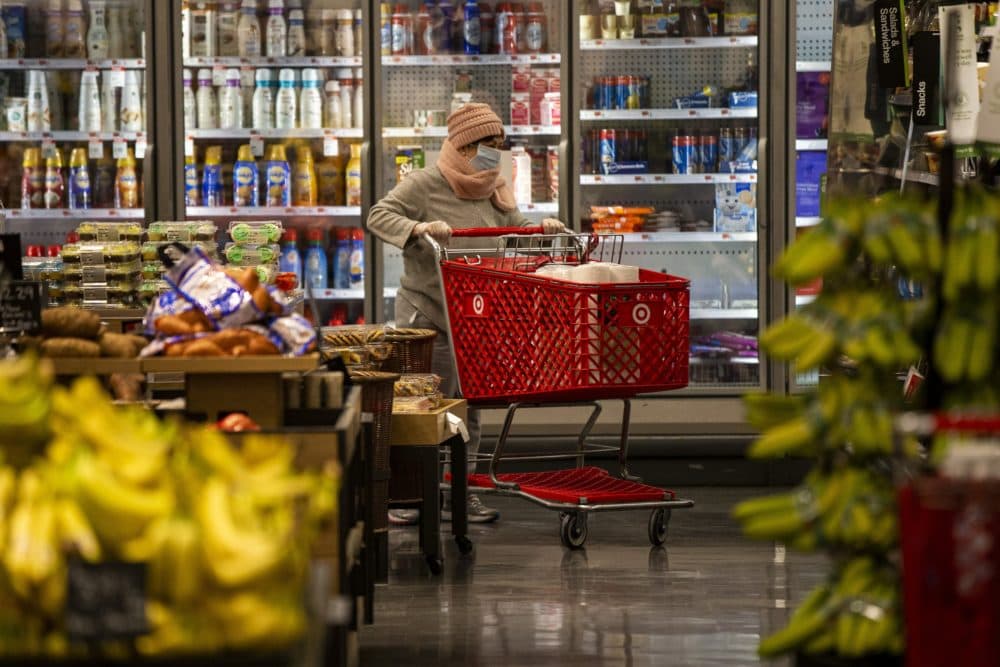Advertisement
Commentary
In This New Normal, Somehow It's Getting Easier And Harder At The Same Time

This week my 2.5-year-old daughter started saying, “what means that?” about everything.
I noticed that my 6-year-old twins play together more easily in the morning, right after breakfast, than in the late afternoon before dinner.
Mid-March is apparently frog-mating season, and they get very loud, especially around dusk. On the preservation land in my Boston suburb, the trees are just starting to bud — tiny green and red and yellow specs of color across the late-winter palate. If we continue our walks there, we’ll see the land wake up from its long sleep.
I don’t work out in the morning anymore. Now I use that time, before the house wakes up, to work. It’s the quietest part of my day, and sometimes right when I wake, I forget about the coronavirus for a moment. And then, “Oh, right.”
The kids are going to bed later (and waking later), which works for now. Our 11-year-old dog seems a little confused, but is generally happy to have us around. My usually very busy street is quiet; so quiet that I notice now when a single car drives by.
... sometimes right when I wake, I forget about the coronavirus for a moment. And then, “Oh, right.”
Lots of mom friends in town are emailing me worksheets and lesson plans and daily schedules. I understand their desire for a routine, and I admire the fortitude and vigor with which they’ve added “homeschooling” to their portfolios. But I’m not there yet. I haven’t determined how to take care of my kids, keep my house in order, work, maintain my sanity and teach kindergarten. We’ll get there. Every day seems to gets a little easier and a little harder at the same time, as we settle into a new normal.
Sunny days are a salve. Cold, clouds and rain are much harder, at least for me. Yesterday we took the kids to a big field down the street, to ride bikes and run around. We avoided the playscape, but we did play hide and seek on the basketball court, and we timed ourselves racing a made up obstacle course: walk to the blue tape, feet on the white line; three hops to the curb; balance on the curb to the crack; backward off the curb; run the blue tape to the finish line. My 6-year-old bested my time.
Advertisement
A man and his young son were out at the park, too. As he passed me and my scooting toddler, the dad took his son’s hand, guiding him off the sidewalk and into the street. It’s what I would’ve done too, to keep our distance, but it was strange.
Lots of people are talking about 9/11, and how this feels like that. I agree. I lived in New York City in 2001, and I saw the second plane hit the South Tower, from my office building on 10th Avenue at 55th Street. I wore blue pants that day that matched the sky. Then, as now, people walked around in a daze. The world felt surreal. Is this really happening? Did those buildings just fall over, and blanket the city in dust and smoke?

I’ve also noticed these past several days how differently people manage stress. My husband is an academic economist, and he worked at the Treasury Department just after the 2008 financial crisis. He is naturally high strung, but has been especially so, as he digests massive amounts of data — on economic indicators, on the epidemiology of the disease, and then pounds out memos and calls his colleagues to discuss what the government response ought to be.
My first impulse was to move furniture, reorganize bookshelves and throw things away. I’m trying to exert some sense of control over a situation in which I have very little. I feel quiet; a little bit like I’m underwater. My chest is almost always tight, but it feels better when I exercise or walk for a long time outside. It helps to talk on the phone or FaceTime. The text chain with my college girlfriends has never been so active.
I think I’ve been doing all the things we’re supposed to do: waking up at a regular time, putting on real clothes, working in a designated space, eating well, I even put on my favorite hoop earrings yesterday. But being home with all three kids and working at a clip that is faster and feels more important than ever is very, very hard. I cried for the first time yesterday, alone in the bathroom.
The only extraordinary thing is that everybody is feeling the same way.
There is nothing interesting or remarkable about my predicament. I have a job, health insurance, a home. I am worried, like a billion other people, about my friends who are health care providers; about my parents, who are perfectly fine, but also in their 70s (or close to it, sorry mom); about my brother, who works in a restaurant and just lost his job; about how we’re all supposed to manage this.
The only extraordinary thing is that everybody is feeling the same way.
The epidemiologists say that social distancing is temporary, a matter of weeks or months. We can do that. The mental health experts say we can use this pandemic as a teachable moment for our kids and maybe for ourselves.
If anything, I’ve noticed how difficult it can be for me to slow down to the pace of my children. They see wonder everywhere, while I’m often fixated on the next thing — a meal, the nap, the laundry pile, the dishes, my to-do list.
It doesn't feel like I can take on much more right now, but I’m going to work on that.
